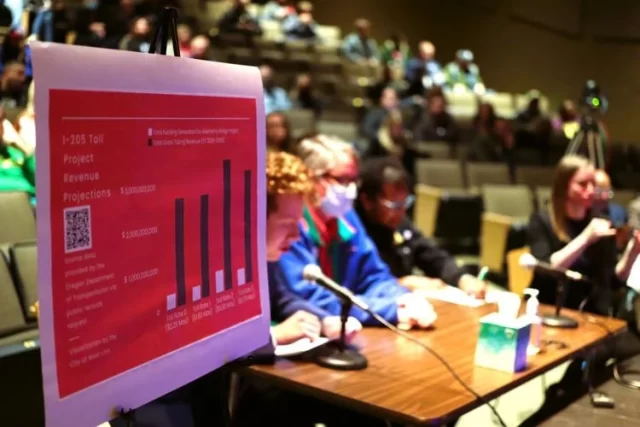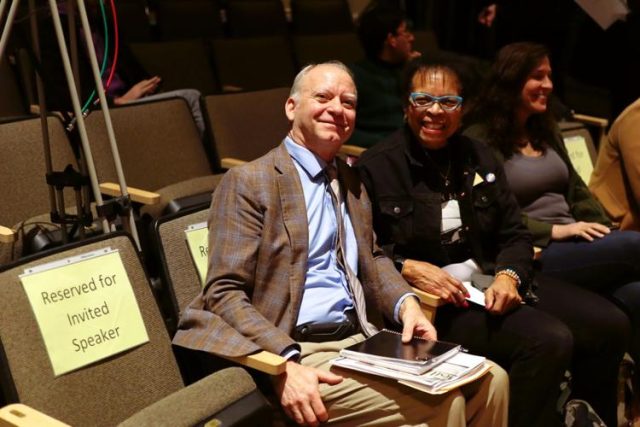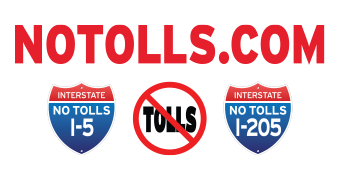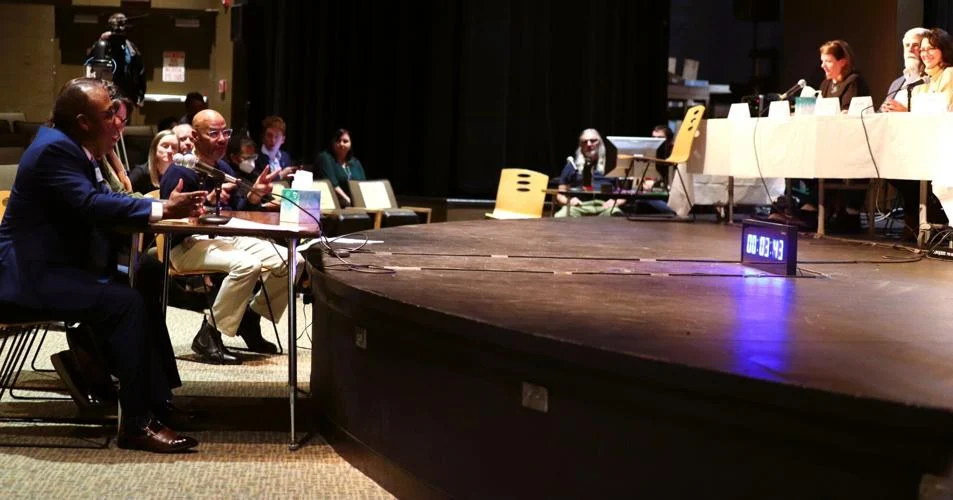Clackamas County Commission is supporting Initiative Petition 4
Jan 6, 2024 Canby Herald
Do you oppose the “unending bureaucratic extortion” that state officials propose through tolling freeways in Oregon?
Asked the question by an angry citizen, scores in the audience raised their hands to protest ODOT’s push for tolling during a public hearing by legislators on Oregon’s transportation committee on Jan. 6. Political fireworks continued throughout the meeting, including another speaker who brought a severed dollar bill to show ODOT’s proposed high administrative costs through its tolling scheme.
Legislators held the special meeting on tolling at Gladstone High School to hear citizen concerns that have been intensifying throughout Clackamas County and statewide. Despite Transportation Committee Co-Chair Lew Frederick’s admonition to hold the applause, hundreds of citizens in the GHS auditorium repeatedly shouted in support of the county’s elected officials who unanimously criticized ODOT’s approach.
So many citizens wanted to speak for their two minutes each allotted by the transportation committee that many remained on sign-up pages at the end of the two-hour hearing. Frederick’s request that they submit their comments online was met with jeers.
At one point, a speaker asked the committee to signal whether it would support citizens’ vote-before-tolls petition. Frederick responded that the committee members were attending to listen, not to have a discussion or debate, but he noted that some of the committee members were in favor of rolling back tolling proposals.
Speakers during a Jan. 6, 2024 public hearing included state Sen. Mark Meek, D-Clackamas County, Rep. Annessa Hartman, D-Gladstone/Oregon City, and Jules Walters, D-West Linn. PMG video Raymond Rendelman
Committee members Sen. Mark Meek, D-Clackamas County, and Rep. Annessa Hartman, D-Oregon City/Gladstone, had attempted to advance anti-tolling legislation, but other iterations of legislative transportation committees refused to hear their bills. Citizens wondered whether Frederick would be the type of committee leader who would help advance anti-tolling legislation.
“We’ll take that under advisement,” Frederick said.
Frederick later explained that he hadn’t yet made up his mind about whether to proceed with tolling, but that he would be seeking equitable and safe solutions to Oregon’s transportation funding woes, using input from members of the public. Along with Hartman and Meek, speakers in opposition to tolling during the public hearing included Jules Walters, D-West Linn.
“The overwhelming opposition to tolling you see today is the result of this failure to engage in a reasonable public debate,” Meek told members of the committee. “Tolling will make life harder and more expensive for Clackamas County families; it will increase traffic and congestion by causing diversion on our local streets; and it will make our neighborhoods less safe.”
Mayors from Oregon City, Gladstone and West Linn were unanimous in their opposition to tolling while speaking to the committee. Among other speakers, Metro Councilor Christine Lewis said that she hears daily from constituents about their opposition to tolling, while County Commissioner Paul Savas pointed out that traffic from highway diversion is six times more likely to be involved in fatal crashes.
“Our local roads are not designed to handle freeway spillage,” Savas said. “I’m appalled that safety has taken a backseat to revenue generation.”
Last May Gov. Tina Kotek called for a “pause” in tolling implementation to get more input but said “tolling must remain a critical component of how our state moves forward with funding transportation infrastructure.” Lewis and Oregon City Mayor Denyse McGriff recently met with Kotek, whom they urged to stop tolling.
“It’s time to make the tolling pause permanent and go back to the drawing board,” Oregon City Commissioner Adam Marl told the Special Subcommittee on Transportation Planning.
In lobbying the governor, McGriff said that she told the governor that the tolling pause hasn’t achieved the governor’s goal of incorporating citizen input. Working with ODOT, McGriff said that the transportation department’s message remains, “Thank you very much for your information, but we’re not changing anything.”
McGriff and Lewis “both spoke adamantly to the governor that ODOT had broken the public trust and we didn’t see a way back for them to regain that trust,” McGriff said. “Oregon City would be irrevocably broken by diversion, and we don’t see it as fair to sacrifice the oldest city for very little gain.”

West Linn Mayor Rory Bialostosky filed a public records request to uncover internal documents showing that a large portion of ODOT’s tolling revenue would go to administrative costs.
“Despite knowing this, ODOT is moving full steam ahead,” Bialostosky said.
County Chair Tootie Smith said that the county commission is supporting Initiative Petition 4, to require a vote of citizens before tolls can be implemented in Oregon, to encourage the legislature to reconsider its instructions to ODOT.
“This is your opportunity to shine and bring workable solutions to Clackamas County,” Smith said.
Nellie deVries, executive director of Clackamas County Business Alliance, said that the state should be working to encourage new companies. Urging the state to “think like a business,” deVries questioned whether the proposed tolling would provide an efficient funding source or serve the state’s “customers” who are its voters and constituents.



